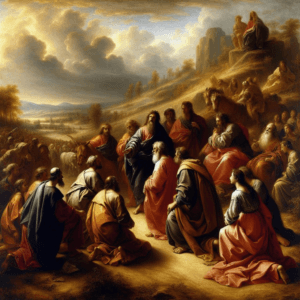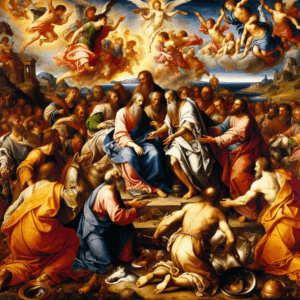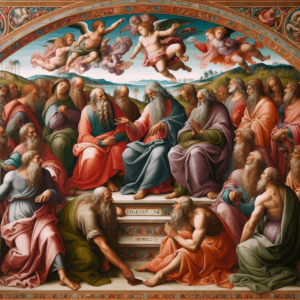HAGAR FLEES
The moral implications that you and I read into this are not quite here in the historical record.
Abram and Sarai were brought up in Ur of the Chaldees where this was a common practice, and the moral angle is not the thing that for them was so wrong.
The terrible thing was that they just did not believe God. The wrong that they committed by Abram taking Sarai’s maid Hagar was a sin, and God treated it as such.
But today we reverse the emphasis and say that taking a concubine is a sin, but we do not pay too much attention to the unbelief. Yet the unbelief was the major sin here; that is, it was lots blacker than the other.
With Abram in his mid-80s, Sarai has apparently become tired of waiting. In her eyes, it is time to go to plan B: giving her Egyptian servant girl Hagar to Abram, in order to finally obtain a child.
Apparently, if a wife was unable to bear children, it was considered appropriate for her to give a servant to her husband, as another wife, with the understanding that any children born to that servant would rightfully become the child of the original wife.
In a disappointing moment of faithlessness, Abram agrees, and Hagar quickly becomes pregnant.
Then the plan unravels. Hagar, elevated from slave to wife and now birth mother, begins to treat her mistress Sarai with contempt. Perhaps Hagar wondered what she and Abram need Sarai for.
Perhaps she resented the idea that her child would belong to Sarai. In any case, the dynamic changes. Sarai’s feelings about her plan change, as well. She makes it clear to Abram that she holds him responsible for this conflict!
And, she demands that he make clear that Sarai remains in authority over Hagar. Again, Abram agrees. With that approval, Sarai deals harshly with Hagar, so harshly that Hagar runs off into the wilderness alone, maybe fearful for her life.
God, however, will not allow Hagar and her child to be discarded so easily. The angel of the Lord, perhaps Yahweh Himself, finds Hagar resting at a spring along a road leading back to her homeland of Egypt.
He gives to Hagar a command and a promise.
First, the angel of the Lord tells Hagar to return and submit to Sarai. Then He reveals that she will bare a son, Ishmael, and that his offspring will become so numerous as to be uncountable.
However, he will be a “wild donkey” of a man and his life—and the lives of his descendants—will be marked by conflict with everyone. In spite of this mixed news, Hagar is astonished and grateful that God has heard her.
The name of her son, Ishmael, means “God hears.” She names the Lord who heard her cry and came to her the “God of seeing” and names the well Beer-lahai-roi, “well of the living One who sees.”
Hagar returns to Abram and Sarai, and Ishmael is born. While God has given a guarantee of blessing to Hagar and Ishamel, this boy is not the child of the promise.
This was not how God planned to accomplish His will, and the son born from Abram’s second wife is not the fulfillment of the Lord’s vows to Abram.
Another 13 years will pass before God will fully reveal His plan to Abram, giving he and Sarai their long-awaited son.
Genesis 16:6-16 KJV
[6] But Abram said unto Sarai, Behold, thy maid is in thy hand; do to her as it pleaseth thee. And when Sarai dealt hardly with her, she fled from her face.
[7] And the angel of the LORD found her by a fountain of water in the wilderness, by the fountain in the way to Shur.
[8] And he said, Hagar, Sarai’s maid, whence camest thou? and whither wilt thou go? And she said, I flee from the face of my mistress Sarai.
[9] And the angel of the LORD said unto her, Return to thy mistress, and submit thyself under her hands.
[10] And the angel of the LORD said unto her, I will multiply thy seed exceedingly, that it shall not be numbered for multitude.
[11] And the angel of the LORD said unto her, Behold, thou art with child, and shalt bear a son, and shalt call his name Ishmael; because the LORD hath heard thy affliction.
[12] And he will be a wild man; his hand will be against every man, and every man’s hand against him; and he shall dwell in the presence of all his brethren.
[13] And she called the name of the LORD that spake unto her, Thou God seest me: for she said, Have I also here looked after him that seeth me?
[14] Wherefore the well was called Beer–lahai–roi; behold, it is between Kadesh and Bered.
[15] And Hagar bare Abram a son: and Abram called his son’s name, which Hagar bare, Ishmael.
[16] And Abram was fourscore and six years old, when Hagar bare Ishmael to Abram.
Genesis 16:6
But Abram said unto Sarai, Behold, thy maid is in thy hand; do to her as it pleaseth thee. And when Sarai dealt hardly with her, she fled from her face.
 The Scripture doesn’t tell us what Sarah did. The text suggests Sarai was requesting Abram settle the question of whether Hagar was still bound under Sarai by a servant-master authority.
The Scripture doesn’t tell us what Sarah did. The text suggests Sarai was requesting Abram settle the question of whether Hagar was still bound under Sarai by a servant-master authority.
Sarai was the one who had given Hagar to be Abram’s wife in hopes of getting a child for herself. Sarai did not, apparently, anticipate that Abram’s new wife would come to look on her mistress with contempt.
When Sarai came to Abram to hold him responsible for this imbalance in power, Abram gave Sarai exactly what she wanted. He tells Sarai to do to Hagar as she pleases and makes it clear that the woman is still under Sarai’s full authority.
Abram might not have anticipated how harsh Sarai’s response to Hagar would be. Scripture doesn’t specifically reveal all the emotions in play. Perhaps Abram was feeling guilty for agreeing to the plan in the first place.
Sarai certainly seems to be holding over his head that he “embraced” this woman, even though it was at her urging.
In addition, Sarai was likely stung with grief and jealousy that another woman had so easily become the bearer of Abram’s child, something she had always hoped to be. Even worse, this woman had become smug and contemptuous of her.
Whatever the feelings, Sarai seems to have unleashed them on Hagar by dealing harshly with her. Hagar ran, possibly even fearing for her life.
Genesis 16:7
And the angel of the LORD found her by a fountain of water in the wilderness, by the fountain in the way to Shur.
 Every evidence is, this “Angel of the Lord” is none other than a pre-incarnate appearance of the Lord Jesus Christ. Now pregnant and alone, Hagar escapes into the wilderness, to a spring on the road to Shur.
Every evidence is, this “Angel of the Lord” is none other than a pre-incarnate appearance of the Lord Jesus Christ. Now pregnant and alone, Hagar escapes into the wilderness, to a spring on the road to Shur.
Hagar may have been heading back to her homeland of Egypt. The “angel of the Lord” found her by that spring.
This “angel of Yahweh” may have been a theophany: God taking on a human form on earth to accomplish a specific purpose. Alternatively, this might have been some other angel or angelic being.
The context and phrasing of this chapter seem to suggest this was, in fact, the Lord Himself (Genesis 16:10, 13).
Genesis 16:8
And he said, Hagar, Sarai’s maid, whence camest thou? and whither wilt thou go? And she said, I flee from the face of my mistress Sarai.
 In running away, Hagar is most likely heading back to her homeland in Egypt (Genesis 12:15–16; 16:1). Along the way, the “angel of the Lord” finds her at a spring beside the road.
In running away, Hagar is most likely heading back to her homeland in Egypt (Genesis 12:15–16; 16:1). Along the way, the “angel of the Lord” finds her at a spring beside the road.
He immediately identifies that he knows her, addressing her as Hagar, the servant of Sarai. He asks where she has come from and where she is going, things he likely already knows, as well.
Hagar answers honestly. She is fleeing from Sarai. The “angel of Yahweh,” which seems to be the Lord Himself (Genesis 16:10, 13), will have some surprising instructions and prophecies for Hagar in the following verses.
Genesis 16:9
And the angel of the LORD said unto her, Return to thy mistress, and submit thyself under her hands.
 Had she not obeyed, she would no doubt have died in the wilderness. First, the angel of the Lord tells Hagar to return to Sarai and to submit to her. In the following verses, he will give her a surprising glimpse into her unborn son’s future.
Had she not obeyed, she would no doubt have died in the wilderness. First, the angel of the Lord tells Hagar to return to Sarai and to submit to her. In the following verses, he will give her a surprising glimpse into her unborn son’s future.
The nation who comes from this son—Ishmael—will be influential, but marked by perpetual conflict. Abram and Sarai’s attempt to hurry God’s promises will have drastic consequences for human history.
Genesis 16:10
And the angel of the LORD said unto her, I will multiply thy seed exceedingly, that it shall not be numbered for multitude.
 However, the Lord said nothing about Faith, because there was no faith in the heart of Hagar, and neither would there be any in the heart of her son, Ishmael.
However, the Lord said nothing about Faith, because there was no faith in the heart of Hagar, and neither would there be any in the heart of her son, Ishmael.
After telling Hagar to return and submit to Sarai, the angel of the Lord now makes a familiar promise to this slave girl. It’s familiar because it’s the same promise the Lord made to Abram himself multiple times over the last few chapters.
Specifically, that He—this angel of the Lord—will multiply Hagar’s offspring so that they become uncountable. Of course, only the Lord Himself could likely make such a promise.
This is a primary reason most scholars presume this “angel of Yahweh” to be a theophany, the Lord Himself in a physical form.
All the same, this child is not the promised heir for Abram and he will not inherit the blessings which God has guaranteed for Abram’s descendants.
In the following verses, this promise is followed by a prophecy explaining that the future is not entirely good news for Hagar and her unborn son, Ishmael.
— part-2 —
Genesis 16:11
And the angel of the LORD said unto her, Behold, thou art with child, and shalt bear a son, and shalt call his name Ishmael; because the LORD hath heard thy affliction.
 The fault of her situation did not belong with Hagar, but rather with Abraham and Sarah. However, she ultimately forfeited what the Lord could have done for her by opposing His Plan, which was Isaac. “Ishmael” means “God hears.”
The fault of her situation did not belong with Hagar, but rather with Abraham and Sarah. However, she ultimately forfeited what the Lord could have done for her by opposing His Plan, which was Isaac. “Ishmael” means “God hears.”
However, it has nothing to do with Ishmael, but rather the plight of Hagar. Here, that promise is followed by a formal prophecy, something occasionally referred to as a “birth oracle” and often delivered by angels.
First, the angel of the Lord reveals that Hagar’s child is a boy, and she will call him Ishmael. Ishmael means “God has heard.” In this case, it meant that the Lord listened to Hagar’s affliction and stepped in to help.
The oracle continues in the following verse.
Genesis 16:12
And he will be a wild man; his hand will be against every man, and every man’s hand against him; and he shall dwell in the presence of all his brethren.
 These predictions describe the Arab people perfectly. They cannot get along with anyone in the world, and they cannot even get along among themselves.
These predictions describe the Arab people perfectly. They cannot get along with anyone in the world, and they cannot even get along among themselves.
The descendants of Ishmael dwell in the presence of all his brethren [Israel], but do not subdue them and, in fact, never will subdue them!
The rest of the oracle is less favorable. Even though Ishamel will be the first son born to Abram, he is not the promised child which God has guaranteed. This was not the way God intended to fulfill His vows to Abram.
And so, this firstborn boy of Abram will become a wild donkey of a man. He won’t be a people person. His hand will be against everyone and everyone will be against him. He will live in hostility to his kinsmen.
Eventually, we will learn that Ishmael’s descendants become the Arabic people. These cultures have been at odds with the Jewish people for millennia.
The descendants of Ishamael soon take on a bedouin lifestyle, on the fringes of society, committed to their personal freedom above the need to be accepted by others.
Genesis 16:13
And she called the name of the LORD that spake unto her, Thou God seest me: for she said, Have I also here looked after him that seeth me?
 Hagar recognized that the Angel was, in fact, the Lord, actually the God of Abraham. Hagar gave the name to the Lord of “El Roi,” which means, “You are a God Who permits Himself to be seen.”
Hagar recognized that the Angel was, in fact, the Lord, actually the God of Abraham. Hagar gave the name to the Lord of “El Roi,” which means, “You are a God Who permits Himself to be seen.”
As is obvious, she truly had a wonderful Revelation, but, sadly and regrettably, her self-will overrode her faith.
She wanted her son, Ishmael, to be the heir of Promise, but that was not to be. She would even go so far, even as we will see, to try to kill Isaac. And so do all who reject the Cross follow in her footsteps.
In spite of the negative conclusion to the prophecy, Hagar speaks of the Lord in glowing terms. She names Him “a God of seeing.” He saw and looked after her, and she was allowed to see Him.
She appears to be rightly astonished by the whole experience.
Genesis 16:14
Wherefore the well was called Beer–lahai–roi; behold, it is between Kadesh and Bered.
 “Beer-lahai-roi” means “Well of the Living-Seeing God.” In her astonishment and gratitude that the Lord has seen and heard her in her distress, Hagar gives a commemorative name to the well where the Lord found her in the desert.
“Beer-lahai-roi” means “Well of the Living-Seeing God.” In her astonishment and gratitude that the Lord has seen and heard her in her distress, Hagar gives a commemorative name to the well where the Lord found her in the desert.
She calls it Beer-lahai-roi, which means “well of the living who sees me.”
Putting the name of the well together with the meaning of God’s name for Hagar’s son, Ishmael, the troubling events of Hagar’s life include the powerful declaration that God hears (“Ishmael”) and God sees (“Beer-lahai-roi”).
God is not silent or absent. He is paying attention. He cares and provides.
We’re told the location of the well is between Kadesh and Bered, but the precise spot is currently unknown. Abram’s son Isaac later settled there for a time (Genesis 25:11).
History bears out the angel’s prophecy for Ishmael: his descendants will become the Arabic peoples. This culture will become numerous and powerful, but will also be renowned for conflict, especially against the Jewish people.
Genesis 16:15
And Hagar bare Abram a son: and Abram called his son’s name, which Hagar bare, Ishmael.
 Hagar, without doubt, related to Abraham all that had happened, placed herself under the authority of Sarah, and Abraham was then careful to name the boy what the Lord had said —“Ishmael.”
Hagar, without doubt, related to Abraham all that had happened, placed herself under the authority of Sarah, and Abraham was then careful to name the boy what the Lord had said —“Ishmael.”
In obedience to the angel of the Lord (“Yahweh”), Hagar returned to Abram and Sarai.
What must they have thought and felt when she reported that the Lord had found her, and explained the promises He had made to her?
Her running away was triggered by harsh treatment from Sarai (Genesis 16:6), who was angered by Hagar’s newfound contempt (Genesis 16:4).
Whatever Sarai might be thinking at this moment, her relationship with Hagar will, it seems, never become warm.
In fact, in chapter 21, we will see Sarai—by then renamed Sarah—demand that Abram cast Hagar and her son out of the family (Genesis 21:9–10).
In any case, Abram does indeed name the boy Ishmael, which means “God hears.” The name certainly has meaning for Hagar (Genesis 16:10–13). And, it might have also sent a message to Abram and Sarai.
Through their experiment attempting to bring about God’s promise on their own timeline, they have learned He was still listening, still seeing, and would still keep His promises to Abram.
In any case, it’s clear both that God was acting in the birth of Ishmael and that, though this son would be blessed, he was not the child of God’s covenant promises to Abram.
Genesis 16:16
And Abram was fourscore and six years old, when Hagar bare Ishmael to Abram.
 Onescore= 20 years, so 20 years times 4 = 80, plus six years totals 86. Abraham would yet have to wait some 14 years before the Promise would be fulfilled.
Onescore= 20 years, so 20 years times 4 = 80, plus six years totals 86. Abraham would yet have to wait some 14 years before the Promise would be fulfilled.
As previously asked, I have to wonder if this lapse of faith did not prolong the waiting period for the Promise to be realized!
Genesis 16 ends by reporting Abram’s age at the time Ishmael was born. God had promised to make of Abram a great nation and to give to him the land of Canaan.
The initial promises had been given when Abram was already seventy-five years old (Genesis 12:4). The arrival of an heir had not happened, yet, and from a human perspective seemed more and more unlikely.
Even ten years after God’s further promises (Genesis 16:3), Abram and Sarai were childless.
And so, Abram, at Sarai’s urging, attempted to move things along through scheming and struggling on their own. The result was both conflict and blessing, with the promise of more conflict and blessing for generations to come.
Hagar immediately conceived a son, but was at odds with Sarai (Genesis 16:4–6). And the child born to Sarai’s servant Hagar was not the child of Abram’s covenant with God.
Ishmael would be blessed by God, but his descendants would be forever in conflict with others, especially their “kinsmen:” the other descendants of Abram (Genesis 16:11–12).
So, at 86 years old, Abram would obtain a son, but not the son of promise. In fact, Abram will wait another 13 years before God would reveal the details of His plan for the next stage of Abram’s life.
I hope that you have really enjoyed this post,
Please Leave All Comments in the Comment Box Below ↓













Hey 🙂
Thanks for the article, it was very informative and eye-opening.
I never thought about the whole situation from the perspective of unbelief being the major issue. It’s crazy how things turned out with Hagar and Sarai’s plan not going as expected and it’s fascinating to think about what might have been going through their minds during these events.
And the part about Ishmael and his descendants being marked by conflict is quite intriguing.
Can’t wait to read more about the unfolding of God’s plan in future articles 🙂
Keep up the good work!
Hello Matias,
Thank you for stopping by, adding value to this HBS & DwJ Platform.
Your opinion on this topic is very much appreciated.
Blessings To You My Friend!
Wow,
I found this really interesting!
It sheds light on the human side of the biblical narrative, showing how Abraham and Sarah’s impatience led to unexpected consequences.It’s a reminder of how faith can waver and how, at times, we might take matters into our own hands. The inclusion of scripture verses provides context and depth to the story.
Thanks for sharing this thought-provoking piece!
Hello Jake Devins,
Thank you for stopping by again, adding value to this HBS & DwJ Platform.
I really appreciate you finding Hagar Flees – The Plight Of Hagar to be really interesting. Please feel free to continue stopping by to add value to this HBS & DwJ Platform.
Your opinion on this topic is always very much appreciated.
Blessings To You My Friend!
Yes indeed,
Hagar has a huge plight!
But in the same time she reaped what she sew. Let me explain myself: when she conceived her child, she became arrogant towards Sarah and thought she was already superior to her.
And Sarah treated her accordingly, with fire and fury. People say that hell has no fury like a woman scorned. And Sarah never forgot. When her child was born, she kicked Hagar out.
This is the sad reality of scheming and not waiting on the Lord’s promises!
Hello angelce903,
Thanks a lot for stopping by, sharing your interest, and your comment.
Warm Regards To You My Friend!
Hi there,
I just read your article on Hagar’s plight and found it to be a deeply insightful exploration of her story.
Your analysis of her situation and the spiritual lessons we can draw from it is both thought-provoking and enlightening. However, I’m curious about how you interpret the broader implications of Hagar’s story in the context of modern-day challenges faced by women in similar situations of distress and marginalization.
Do you see any direct parallels or lessons that can be applied to societal issues?
Thank you for your work and for sharing these profound insights!
Warm regards
Makhsud
Hello Makhsud,
Thank you for stopping by and commenting on Hagar Flees – The Plight Of Hagar.
It is particularly important to understand that Hagar was economically exploited and physically abused, a foreigner, an outsider, a slave, and a handmaid to Sarah who turned her into a sex object.
These cultural norms help explain the story as it unfolds, but on the human level do not make it any less painful for Hagar. But the human level of the historical context is not the only dynamic of Hagar’s story. Indeed, this isn’t Hagar’s story, any more than it is Abraham’s or Sarah’s. This is God’s story.
The Holy Bible is the story of how God saves His people, and in this chapter of that story, He makes a covenant with Abraham (a binding legal promise) that He will Bless Abraham with many descendants, and that through Him all nations of the world would be blessed as well.
You are welcome for my work and for the sharing of these profound insights.
Warm Regards To You As Well!
Thank you for this very detailed story.
I wholeheartedly agree that the issue at stake here was Sarai’s unwillingness to wait, and Abraham not quite being the man of faith he is meant to be. So often when we step in to make something happen instead of waiting for God to do his work, we create problems for ourselves.
I’m curious about Ishmael being the father of the Arabs. I remember hearing that previously but have since come to understand that was not the case. I believe it came from Josephus a Jewish historian, but apparently, the Qu’ran does not subscribe to this. I suppose we can’t know for sure either way.
Anyway, you have provided a very detailed account of the story and I appreciate that you also have compassion for Hagar – she was indeed mistreated and God very definitely had compassion on her.
Many blessings on your future endeavours online.
Hello Debbie,
Thanks for stopping by.
In Genesis, the identity of people groups is often traced back to an ancestor, and the group is then named after this ancestor.
How do the Ishmaelites fit into this pattern?
Genesis associates various descendants and relatives of Abraham with people groups. These include:
Abraham’s sons:
Ishmael, ancestor of the Ishmaelites (language unidentifiable).
Midian, ancestor of the Midianites (language unidentifiable).
Isaac, father of Jacob (Israel), ancestor of the Israelites (language family: Canaanite); & father of Esau, ancestor of the Edomites (language family: Canaanite).
Lot’s sons (Lot was the son of Abraham’s cousin Haran):
Moab, ancestor of the Moabites (language family: Canaanite).
Ben-Amm, ancestor of the Ammonites (language family: Canaanite).
Note that the identifiable languages associated with groups descended from Abraham and his nephew Lot are members of a closely related family known in Semitic linguistics as “Canaanite” languages. These were very similar and could have been mutually comprehensible.
The Moabite and Ammonite languages, associated with the descendants of Lot through his two sons, are in the same group as Edomite, associated with Esau, and Hebrew, associated with Jacob or Israel.
This suggests that the Ishmaelites would have been speakers of a Canaanite dialect as well, like all the other branches of Abraham’s family.
Although Arabic is related to Canaanite languages, the connection is more distant. Canaanite languages are grouped together with Aramaic and Amorite to form a higher level Semitic subfamily known as Northwest Semitic. Then, further back in time, this grouping in its turn was connected to Arabic in a subfamily known as Central Semitic.
Thanks again for stopping by.
Many Blessings On Your Future Endeavours As Well!